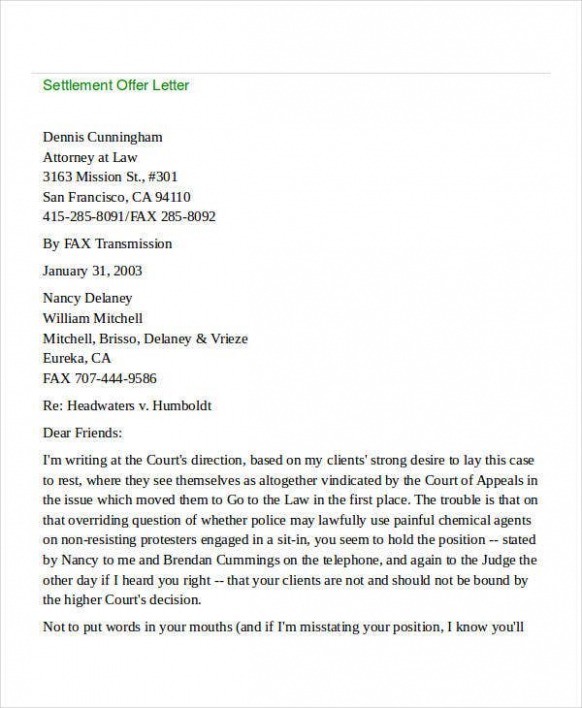Legal Settlement Offer Letter Template Taxpayers experiencing tax debt troubles rarely compare the internal revenue service deal in concession with the Chapter 13 personal bankruptcy. Often, the Phase 13 will give a much more specific treatment for the taxpayer to solve tax financial debt. This short article examines the loved one benefits of both the offer in compromise and Chapter 13.

An offer in concession might be the most marketed tax obligation solution. You can not listen to radio or enjoy TV without being bombarded by advertisements to resolve your tax obligation financial obligation. Frequently the advertisements proclaim that the internal revenue service has actually revealed that kindness in the collection of the tax obligation financial debt exists for a restricted time. The unfortunate truth is that the kindness announcement by the IRS was commonly for various other issue location, such as tax obligation shelters. The IRS denies roughly 85 percent of all offers in concession submitted due to uncertainty regarding collectibility. Offers in concession are normally filed due to the fact that the taxpayer thinks the tax debt can not be paid, Question regarding Collectibility is one of the most usual sort of offer in compromise. Other types of deals in concession are outside the extent of this short article.
The benefit of the offer in compromise is that the tax obligation liabilities, including the relevant charges as well as passion, are reduced to the quantity the IRS and also the taxpayer agree can be paid. Both celebrations must consent to the regards to the offer in concession. The offer in compromise is a agreement between the internal revenue service as well as the taxpayer. The regards to the contract can be implemented against the taxpayer in addition to the internal revenue service.

Acceptance of the deal in compromise occurs when the IRS believes that the offer is at the very least as much as could be accumulated by the IRS over the one decade life of the law of restrictions. The IRS will decline an deal that is for a minimal amount than it can or else gather.
The internal revenue service utilizes a uniform collection of monetary requirements that are not versatile in both the evaluation of the amount paid monthly in an installation agreement as well as in an deal in compromise. These standards limit the expenditures for living that the taxpayer can assert are essential for living. The requirements consist of food, real estate and energies, transport, and also expense wellness cost. The standards may cause extreme troubles for a taxpayer with a reasonably higher standard of life. Business expenses are not impacted by the standards.
The evaluation of the minimal offer in concession that will certainly make the deal processable is the equity in the taxpayer’s possessions plus the quantity that could be paid in an installation contract over a specific time period. The duration of the future regular monthly payments thought about by the internal revenue service relies on just how the deal will certainly be paid by the taxpayer. The internal revenue service wants 48 months of regular monthly repayment if the taxpayer offers a round figure. The internal revenue service wants 60 months of monthly repayment if the deal is to be paid in a short term agreement of two years or less. Nonetheless, the IRS will certainly take into consideration accurate problems such as retirement and wellness of the taxpayer in shortening the duration of the multiplier.



